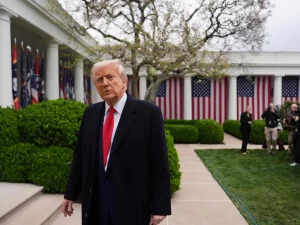Legal Community Unites Against Trump's Executive Orders: A Threat to Justice?
Legal Firms Rally Against Executive Orders

In Washington, over 500 law firms have expressed serious concerns regarding President Donald Trump's executive orders aimed at the legal sector, labeling them as a significant threat to constitutional governance and the rule of law. This collective response marks a notable opposition to a series of White House directives intended to penalize some of the nation's top legal firms and extract concessions from them.
The legal community's brief is part of a lawsuit initiated by Perkins Coie, one of the firms contesting these orders in court. The executive orders demand the suspension of security clearances for lawyers at affected firms, termination of federal contracts, and restrictions on employee access to federal facilities.
Perkins Coie has successfully obtained a temporary court order that halts the enforcement of several aspects of the executive order, although the case remains ongoing.
On Friday, the extensive coalition of over 500 law firms and legal offices submitted a brief urging a judge to permanently block the executive order. In their filing, they described the order as a serious threat to the foundational principles of governance and legal integrity.
The brief highlights the chilling effect of the executive order, stating that any controversial legal representation against the current administration now carries the risk of severe retaliation. It emphasizes that while an administration may gain short-term benefits from such actions, the long-term viability of the rule of law is jeopardized in a climate of fear.
Last month, Paul Weiss became the first firm to negotiate with the White House, committing $40 million in pro bono legal services to support causes favored by the Trump administration, while also ensuring merit-based hiring practices. In return, the White House rescinded a recently issued executive order.
Following this, firms like Milbank and Skadden, Arps, Slate, Meagher & Flom have also reached similar agreements to avoid the imposition of executive orders.
Many of the targeted firms have faced these orders due to their connections with lawyers who have investigated Trump or are viewed as adversaries by the president.
